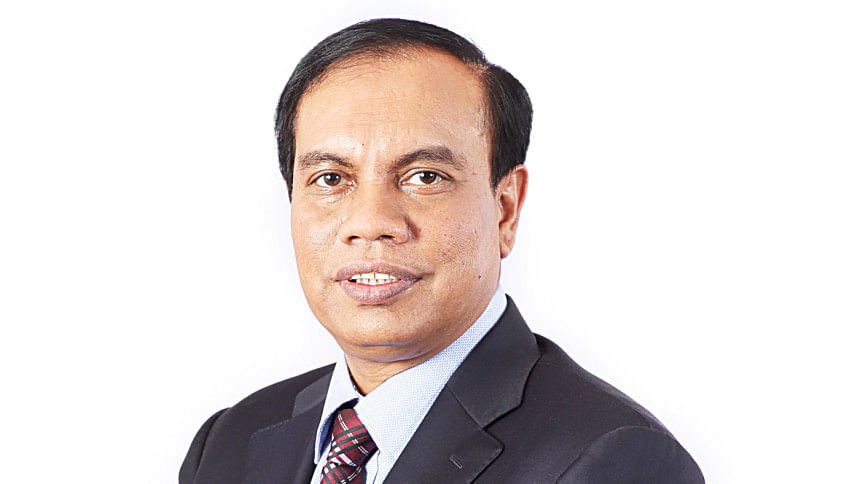Simpler loans, smarter assessments for MSMEs

M Jamal Uddin, CEO &
Managing Director, IDLC Finance
The Daily Star (TDS): How do you assess the current state of the MSME sector in Bangladesh, and what role do you think banks can play in accelerating its growth?
M Jamal Uddin (MJU): The MSME sector in Bangladesh is the backbone of our economy, contributing significantly to employment and GDP. However, it remains underfinanced and underserved. Financial institutions must go beyond traditional banking—by offering need-based financial products, simplifying access through digitization, and embedding themselves as partners in growth. At IDLC, we believe in enabling progress. Our focus on CMSMEs is not just strategic—it's a commitment to inclusive economic development. CMSMEs currently contribute around 25% to Bangladesh's GDP. In comparison, MSMEs contribute about 60% to India's GDP, 50-60% to Vietnam's, and over 70% to China's. These figures highlight the growth potential of our local enterprises and the need for enhanced support to help them reach similar levels of economic impact.
TDS: What are the major challenges MSMEs face in accessing finance, and how is your bank addressing these issues—especially for micro and cottage industries?
MJU: MSMEs, particularly micro and cottage enterprises, face challenges like limited access to formal documentation, lack of credit history, and insufficient collateral. At IDLC, we've made it easier to apply for loans, started using new ways to understand a borrower's ability to repay, and strengthened our connections with local communities. We have also tailored financial solutions with flexible terms and integrated business advisory to ensure these enterprises are not just financed—but guided.
TDS: Does your bank have any dedicated products, financial literacy programs, or credit guarantee schemes targeted at MSMEs? Please share key initiatives.
MJU: Yes. Our offerings include SME Term Loans, Working Capital Financing, Seasonal Loans, and our specialized Women Entrepreneur Loan—Purnota. Beyond products, we prioritize capacity building. Through our dedicated financial literacy wing, we conduct financial literacy and business skills training for small entrepreneurs. We also participate in Bangladesh Bank's Credit Guarantee Scheme to enhance access for first-time borrowers with limited collateral.
TDS: How has your bank leveraged technology or digital banking solutions to improve outreach and services to MSMEs, particularly in semi-urban and rural areas?
MJU: Technology is a key enabler of inclusion. We've digitized SME loan processing through our Loan Origination System (LOS) and credit scorecards, ensuring faster turnaround times, fewer documents, and standardized assessments. Our mobile teams use digital tools to onboard clients even in remote locations, with tab banking allowing relationship managers to assist customers directly as a single point of contact. We've also centralized operations to reduce delays and improve service, streamlining everything through a digital-first approach. Our goal is to ensure that an entrepreneur in Natore gets the same level of access and service as one in Dhaka.
TDS: What steps is your institution taking to support women-led MSMEs and promote financial inclusion among underrepresented segments?
MJU: Women-led MSMEs often face deeper barriers. With our dedicated Purnota - women entrepreneur loan product, we not only provide loans with favorable terms but also offer mentorship and training. We're also working to expand access for youth-led and differently-abled-led enterprises. As a signatory to the UNEP FI Net Zero Banking Alliance and Principles for Responsible Banking, we integrate gender inclusion and SDG alignment in our core lending practices.
6. Looking ahead, what policy reforms or collaborative efforts between banks and the government would you recommend to ensure sustainable development of Bangladesh's MSME ecosystem?
We believe coordinated action is crucial. First, policy should promote blended finance and de-risking mechanisms for smaller enterprises. Second, simplification of trade license requirements and annual renewals, and business performance records would help build credible credit histories. Lastly, public-private partnerships in entrepreneur development and credit guarantee facilities should be scaled and designed to incentivize lenders. We urge regulators to support inclusive SME lending and create easier pathways for small businesses to access formal finance, aligning national development goals with grassroots entrepreneurship.

 For all latest news, follow The Daily Star's Google News channel.
For all latest news, follow The Daily Star's Google News channel. 



Comments